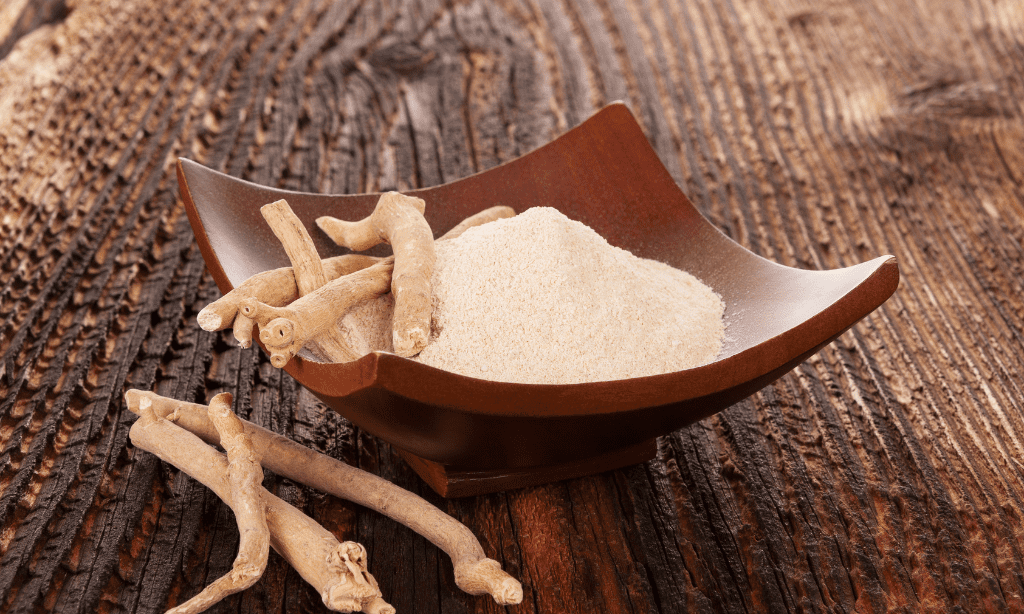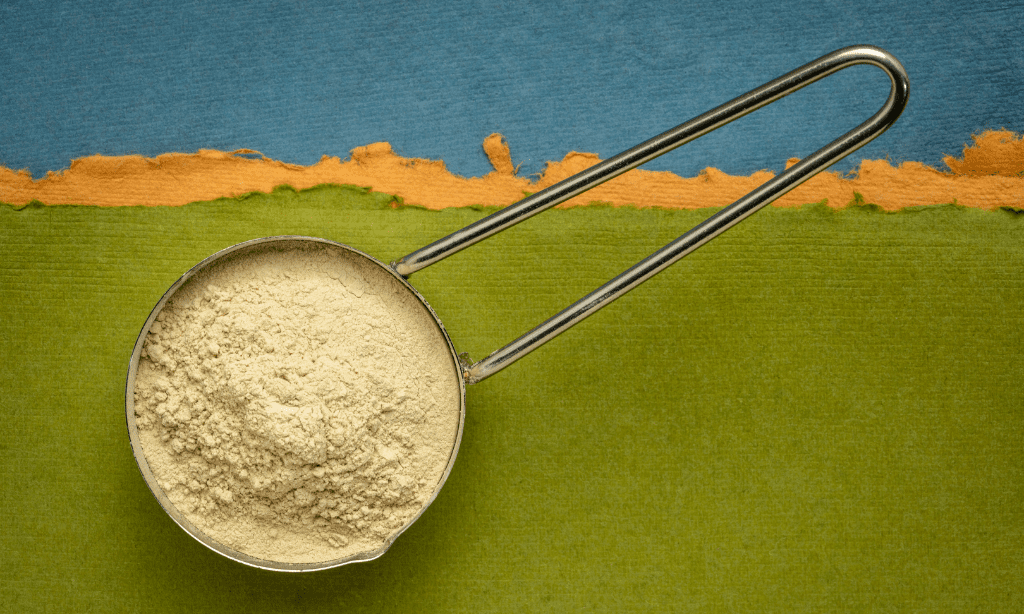Ashwagandha Benefits for Skin and Hair

The medicinal properties of ashwagandha offer a wide array of remarkable benefits for skin and hair health. From hydrating and rejuvenating the skin to addressing acne issues and revitalizing the scalp, this ancient herb has a lot to offer.
Remedy for Acne
Ashwagandha, a traditional herbal remedy, boasts numerous health benefits, including its efficacy in treating and managing acne. Its potent anti-inflammatory attributes effectively diminish inflammation, redness, and discomfort linked to acne breakouts.
Research from 2017 demonstrated that ashwagandha root specifically targets inflammatory skin conditions like acne. Additionally, it helps regulate hormonal imbalances that might trigger excess sebum production, a prime factor in acne development.
Furthermore, ashwagandha functions as a potent antioxidant, safeguarding skin cells against daily environmental stressors such as UV rays and pollutants, both of which contribute to acne.
Revitalizes Dry and Dull Skin
Ashwagandha, deeply rooted in Ayurvedic medicine, offers solutions to common skin concerns. Its active compounds, including Withanolides and Withaferin A, are instrumental in rejuvenating dry and lackluster skin, leading to a smoother and healthier complexion.
By rebalancing skin moisture, ashwagandha can notably alleviate various skin problems, including rosacea and eczema. Moreover, it counteracts oxidative stress caused by free radicals, the culprits behind premature skin aging.
Topical application of creams containing ashwagandha can potentially reduce wrinkles and other signs of aging caused by prolonged exposure to environmental pollutants and sun damage.
Preserves Natural Moisture
Ashwagandha is a potent herb that aids in retaining the skin’s natural moisture. Active compounds such as withanolides, alkaloids, and saponins present in ashwagandha offer both deep cleansing and moisturizing effects for the skin.
Research indicates that ashwagandha can enhance skin hydration by up to 20.66%. Furthermore, topical application reinforces the skin’s barrier functions, enhancing overall resistance to water in the epidermis.
Beyond hydration, this herb also assists in the production of essential skin-enriching components like hyaluronan, elastin, and collagen. These elements are crucial for a vibrant complexion and play a role in countering wrinkles and maintaining youthful skin.
Facilitates Skin Repair
Ashwagandha, an adaptogenic herb with substantial benefits for skin and hair routines, boasts exceptional properties for overall complexion health. Its polyphenols stimulate collagen formation and amplify skin repair processes, contributing to improved skin well-being.
Particularly adept at quelling inflammation, ashwagandha aids in mitigating acne breakouts and soothing various skin inflammations. Furthermore, its active compounds accelerate cell regeneration, revitalizing cells lost due to aging or environmental factors such as UV-induced damage.
Ashwagandha also offers hormone support, promoting better oil gland function and preventing dryness caused by excessive sebum production or lack thereof, all while aiding stress management due to its calming effects.
Anti-Stress Characteristics
Ashwagandha’s anti-stress properties are well-documented, making it a valuable asset in reducing stress and anxiety. Its chemical constituents, including alkaloids, effectively calm the brain and reduce anxiety levels.
Moreover, ashwagandha has demonstrated the ability to lower cortisol production, a stress-associated hormone. As an adaptogen, it enhances the body’s resilience to stressors, potentially boosting overall immunity against stress-induced challenges.
Regular use of ashwagandha might provide support to those susceptible to mood swings, promoting equilibrium, mental clarity, and essential relaxation during tense life moments.
Skin Nourishment
Ashwagandha’s role in restoring and maintaining skin health is noteworthy. It fosters the production of crucial proteins like collagen, elastin, and keratin, nourishing the skin from within.
By supplying ample nutrients, ashwagandha aids in repairing damaged or aging cells, bolstering cell regeneration, and reducing wrinkles, particularly in dry facial areas.
Its moisturizing properties offer protection against harsh weather conditions, guarding against inflammation and uneven patches. Increased collagen synthesis contributes to healthy skin and helps alleviate inflammation from environmental triggers.
Natural Skin Plumping
Ashwagandha root’s diverse skin benefits include its ability to naturally plump the skin. Powerful compounds within ashwagandha stimulate the production of hyaluronan, elastin, and collagen.
Regular ashwagandha use promotes hyaluronan production, deeply moisturizing the skin and maintaining long-lasting softness while preventing dryness, dullness, and fine lines.
Moreover, it sustains collagen levels, encouraging its production while curbing inflammation. By mending skin damage, it unveils a vibrant complexion. Ashwagandha’s adaptogenic properties combat chronic stress-related hormonal imbalances that can lead to hair loss or specific types of acne, visibly diminishing these symptoms with regular use. This collective impact helps maintain natural facial fullness and youthful appearance, free from synthetic fillers.
Scalp Rejuvenation
Ashwagandha is renowned for its revitalizing qualities, especially for the scalp. Esteemed in Ayurvedic tradition, this herb supports scalp and hair health, with its iron content enhancing scalp blood circulation. Additionally, its compounds counteract inflammation and stress, impacting overall physiological wellness.
Functioning as both an adaptogen and scalp stimulant, ashwagandha fosters relaxation while invigorating the scalp, fostering stronger hair growth coverage over time. Regular use aids in combating dandruff and encourages natural oil production in hair follicles.
Fosters Healthy Hair Growth
Ashwagandha’s unique properties actively promote healthy hair growth. By strengthening hair follicles and reducing stress-induced hair loss, it plays a crucial role in maintaining strong and vibrant hair.
It preserves scalp elasticity, providing necessary nourishment for robust follicles and achieving thicker, fuller hair. In addition to promoting new follicles, ashwagandha protects existing ones from shedding by enhancing their strength and volume.
Its antioxidant effects counteract inflammation, minimizing damage to roots and strands caused by environmental toxins and pollutants.
Enhances Hair Pigmentation
Ashwagandha’s transformative potential extends to hair health and appearance. Abundant in antioxidants, it shields strands from oxidative stress-induced damage, potentially delaying premature graying.
Its anti-inflammatory properties work internally to alleviate scalp irritations, balance oil production, and alleviate dandruff—crucial factors in supporting natural hair coloration.
Moreover, ashwagandha’s adaptogenic properties establish ideal conditions for hair growth while fortifying follicles, collectively aiding in preventing premature graying.
How to Incorporate Ashwagandha into Your Skincare Routine

Ashwagandha can be integrated into your skincare regimen through topical application or oral consumption, offering a range of benefits for your skin. Explore both methods to experience the incredible advantages of this herb.
Topical Application
Utilizing creams, gels, or lotions infused with ashwagandha is an effective way to rejuvenate your skin and enhance its overall appearance. Research indicates that applying lotions containing standardized ashwagandha root extract can notably improve the condition and quality of skin in individuals with photoaging.
Moreover, ashwagandha gel serves as a preventive measure against skin infections due to its anti-inflammatory, antifungal, and antibacterial properties. It boosts hyaluronan production, ensuring consistent skin hydration and moisturization.
Thanks to its adaptogenic properties, regular use can aid in alleviating acne caused by hormonal imbalances, effectively reducing redness and irritation.
Oral Consumption
Ingesting ashwagandha through supplements, teas, or gummies can also contribute to skin health. Rooted in Ayurvedic tradition, this herbal remedy is known to improve skin attributes such as wrinkles, pore size, moisture levels, and overall complexion.
Studies demonstrate that consuming ashwagandha in recommended doses promotes anti-stress effects, helping maintain natural skin moisture while soothing stressed skin. Furthermore, oral ashwagandha intake nourishes the scalp, potentially leading to healthier hair growth and pigment retention.
It’s crucial to note that the effects of excessive oral consumption are not fully understood, making it advisable to consult a medical professional before incorporating ashwagandha into your skincare routine.
Ashwagandha’s Suitability for Different Skin Types
Ashwagandha’s adaptogenic nature makes it a versatile addition to any skincare routine, making it suitable for all skin types, effectively addressing specific skin concerns.
Appropriate for All Skin Types
Ashwagandha, a potent Ayurvedic herb, offers benefits to all skin types. It boasts hydrating properties beneficial for repairing dry, lackluster skin, while simultaneously managing oily complexions.
Its antibacterial components help manage infection flare-ups, combat acne, and address conditions like psoriasis, eczema, and dermatitis. Furthermore, it promotes the production of skin-repairing compounds, making it ideal for sensitive skin prone to irritation and redness.
The presence of antioxidants aids in shielding against premature aging and reducing inflammation associated with conditions like leucoderma or scabies. Additionally, its calming attributes offer relief from internal and environmental stressors like sun exposure that can harm your skin’s health.
Targeting Specific Skin Concerns
Ashwagandha, a cherished adaptogenic herb in various Eastern cultures, has gained popularity for its effectiveness in addressing specific skin concerns. Its potent properties contribute to skin improvement, tackling issues like allergies, uneven skin tone, and seasonal dryness.
The anti-inflammatory potency of ashwagandha provides relief from inflammation associated with keratosis resulting from environmental stressors. Moreover, it actively repairs damaged cells, hydrates dry patches, and nourishes the outer epidermal layer with its healing components such as oleanolic acid and ursolic acid. These compounds work harmoniously to fortify the skin’s protective mechanisms, yielding a firm and even-textured complexion.
Additional Benefits of Ashwagandha
Beyond its positive effects on skin and hair, regular use of ashwagandha can promote overall systemic health.
Hormonal Support
Ashwagandha plays a crucial role in hormonal balance. Its adaptogenic attributes modulate and balance various hormones governing physical and emotional responses, contributing to the body’s natural healing processes.
By regulating stress hormones like cortisol, epinephrine, and norepinephrine, as well as reproductive system hormones such as estradiol and progesterone, ashwagandha maintains hormone equilibrium, supporting the proper function of glands secreting these hormones, such as the adrenals and thyroid.
Moreover, this balanced regulation reduces instances of energy depletion, ensuring sufficient hormone production for vitality.
Stress Relief
Ashwagandha, a staple in Ayurvedic medicine, is traditionally used to alleviate stress, inflammation, and pain. Its compounds possess calming and anti-inflammatory properties, inducing an overall sense of relaxation.
Studies affirm ashwagandha’s ability to significantly reduce stress and anxiety levels, making it a valuable tool for stress relief. In addition to its calming effects, research suggests its analgesic properties can soothe the nervous system’s pain response.
Its adaptogenic nature aids the body in adapting better to physical or emotional disturbances by rebalancing hormones, fostering mental clarity, and relieving tension.
Supports Quality Sleep
Ashwagandha’s adaptogenic attributes extend to sleep support. Taken as a supplement alongside other herbs, ashwagandha can calm the central nervous system and enhance a healthy sleep cycle.
It’s associated with improved daytime energy levels and enhanced nocturnal rest. By promoting relaxation and boosting calming hormones like melatonin and serotonin, ashwagandha facilitates faster sleep onset and more prolonged, rejuvenating sleep cycles.
Additionally, it offers a natural alternative for those seeking to avoid conventional sleep medications with potential side effects, providing a safer solution.
Adaptogenic Properties
Ashwagandha’s remarkable adaptogenic properties offer significant benefits. Adaptogens enable the body to regulate and safeguard itself against daily and long-term stress, fostering physiological stability.
By fortifying bodily functions and enhancing resilience against environmental, emotional, and physical stressors, ashwagandha aids in maintaining hormone levels, soothing the nervous system, and mitigating pain responses. Additionally, you can also learn about the habits that harm kidneys
Frequently Asked Questions (FAQs)
Here learn some questions related to the topic:
What is ashwagandha, and what benefits does it offer?
Ashwagandha is a centuries-old Ayurvedic herb known for its multifaceted medicinal properties. It’s been shown to alleviate stress, enhance cognitive function, and bolster the immune system. Moreover, it can promote skin health by stimulating collagen production and combating inflammation.
How does ashwagandha contribute to skin well-being?
The anti-inflammatory attributes of ashwagandha shield the skin from dryness and irritation, simultaneously reducing signs of aging like wrinkles and dark spots. The presence of antioxidants encourages cell regeneration, fostering sustained skin health and a youthful appearance.
Can I directly use ashwagandha for my skincare?
While both oral consumption and topical application can benefit your complexion, utilizing a cream infused with ashwagandha extract topically is likely to yield more pronounced outcomes. This approach delivers higher concentrations directly to skin cells.
Bottomline
In summary, ashwagandha emerges as a potent and natural ingredient replete with diverse advantages for skin health. It effectively averts or diminishes acne, rehabilitates skin affected by environmental factors such as sun exposure or dryness, and internally nourishes the skin while maintaining enduring hydration and revitalization.
Disclaimer: This content is meant solely for informational purposes and should not be construed as a substitute for professional medical advice, diagnosis, or treatment. It is not an exhaustive resource and should not guide decisions regarding health or well-being. For queries related to medical conditions, treatment choices, or health routines, consult a qualified healthcare expert. This material or its content must not replace professional medical counsel.



























